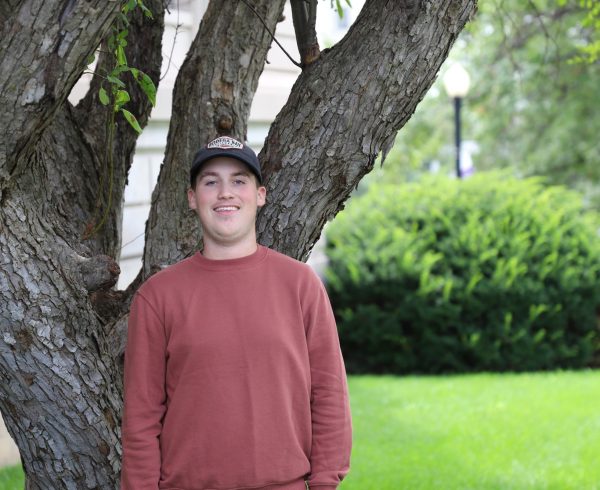Walk around any Omaha Public Schools building, athletic event, musical, or even the North versus Central boy’s state basketball game at Pinnacle Bank Arena in Lincoln, and there’s a decent chance you’ll see Matt Ray.
While many students may not know who he is, his job might very well have a role in their present and future success.
The OPS Board of Education unanimously selected Ray, currently serving as interim superintendent, to be the next superintendent for the district at its Feb. 13 meeting. He will succeed Cheryl Logan, who left the position at the end of the 2022-2023 school year.
Ray will receive a base pay of $336,500 in the contract approved by the board, which goes into effect on July 1, continuing through the 2026-2027 school year.
Ray has developed close ties with the board, working with its members as he navigated his way from teacher to board secretary to chief of staff to deputy superintendent, and eventually where he is now as interim superintendent and soon-to-be superintendent.
Board Member Nick Thielen of Subdistrict 3 said Ray is “a thoughtful leader, and he’ll take their [constituents] concerns seriously as he makes plans for how to move forward.”
The board’s choice came after a yearlong superintendent search with significant community involvement. Ray was chosen over finalists who were a former superintendent from Des Moines, Iowa; a current superintendent in Fort Myers, Florida; and a deputy superintendent from Detroit, Michigan. Thielen said Ray’s long history with OPS was a major factor in the board’s decision.
“The ultimate decision to hire Mr. Ray should not be taken as an indication that the process wasn’t worth it,” Thielen said. “It was an important step in making sure we hired the best person for the job.”
The selection comes at a crossroads for the state’s largest school district. OPS schools have struggled to handle a multitude of issues, like vaping, staff shortages and chronic absenteeism. The high school dropout rate districtwide was 6.7% for the 2022-2023 school year, significantly increasing from its low of 2.5% during the 2013-2014 school year. The district has also undergone major changes with the introduction of programs like Pathways and Academies under Logan’s leadership and the COVID-19 pandemic.
Ray believes the board was right in thinking he would be the best leader for the district during this period. He believes increased accountability will be a huge component of success. He said OPS must admit shortfalls and show improvement to be successful. “I’m not perfect; I will make mistakes,” he said.
Sharing more data and being transparent is a part of that goal. “We’re sharing more data with the Board of Education than we have in years … it’s not all good data, but we know it, and we’re going to do better,” Ray said.
Another goal is to increase OPS’s personal connections with teachers, students and the community. So far, he believes he has made great strides towards achieving that goal. Ray’s schedule is consistently packed full of school-related events. Talking to people and getting input has made the job more peaceful because people trust him, he said.
“How we move forward with treating people is super important,” Ray said. “Because of my relationships with people, there is no shortage of people that tell me reality.”
Many people around Central echoed sentiments that he is improving connections and trust. “He’s super visible, and I believe that is very important,” Assistant Principal Jodi Dierks said. Multiple teachers who spoke to The Register also appreciated his visibility. Many students didn’t know who he was but grew to know and like him after his popular decision for multiple snow days at the start of the second semester.
“I really liked him after those snow day calls; he automatically earned my support,” sophomore Nichole Palfini said.
Ray believes these connections have been helpful to many big decisions in the past few months. These decisions include switching OPS’s busing vendor from Student Transportation of America to Zum Services, Inc. for the next three school years and increasing the variance for special education teachers from 7% to 10%. Increasing the variance was an idea that Ray and OPS took to the teacher’s union, which overwhelmingly supported the idea.
Connections with parents are also being prioritized by Ray, as all three of his children went through OPS and graduated from Central. “Experiencing the school district as a parent helped me understand Omaha Public Schools … my son also had to stand outside for the bus,” he said.
“[Because of my three kids,] I’m able to tell parents, ‘I’m confident in the Omaha Public Schools.’” He appreciates when parents reach out, saying, “I get more information to make more informed decisions.”
While accountability and communication help influence success in the district, it’s not everything, Ray admits. Real strategies must be put forward to change the course of the district. His major policy platform is to decrease staffing shortages, which he believes is possible through “grow your own” programs that he and other district officials are heavily promoting.
These programs, including EdRising and the University of Nebraska Omaha Teacher Scholar Academy, an academy Ray is strongly advocating for, are the ideal starters for improving staffing. The district also has an education pathway, but Ray said he was focusing on EdRising and the UNO partnership.
The Teacher Scholar Academy is a partnership between UNO and OPS that allows new OPS graduates interested in becoming teachers to apply and get a $5,000 scholarship each semester they attend UNO if they are selected. At the end of their UNO schooling, they will be given an open job in OPS immediately.
“Long term, the program will yield impressive results,” Ray said. On teacher retention, however, Ray said the district will need to adapt to teachers not staying with the district as long as they have in the past.
Ray said he isn’t in a position to introduce major programs like past superintendents, as he feels OPS is doing too much.
“I’m not interested in implementing things that will derail the school district in the long term,” he said. “I’m wildly interested in figuring out what we should stop doing.”
To figure out what the district should stop doing, Ray brought up the concept of post-schooling case studies. District employees will analyze data on former students, no matter if they graduated or not. The goal would be to identify and solve negative patterns or influences.
The studies would allow the district to look at the potential educational impacts of frequent moves as a kid or look at how things like Pathways and Next Level Learning, OPS’s summer school program, affect the likeliness of students attending postsecondary education.
The only major change Ray was willing to bring up was school start and end times, which have been a hot topic around the country.
While it may appear overwhelming, Ray believes conversations about it need to begin now, especially as changes to OPS’s calendar, start/end times, and schedules could have an impact on helping solve staffing shortages and improving teacher retention.
“All research points to us flipping elementary and secondary school start times,” he said.
However, Ray acknowledged the fact that it is a huge change that could influence everything from athletics to transportation to students who have jobs and what their work schedules look like.
“It’s not a quick decision; we’re going to take time on it,” he said.
Ray acknowledged that things could change but believes the district will mellow down chaos, solve problems, and become more peaceful if he sticks to his plan by staying in OPS for a long time and breaking the spell of short tenures, as seen with the past two superintendents.
“I feel this calmness, this sense of peace in the organization,” he said.
Ray said his message for people unsure of the district’s future is that he will always make the best decisions for the students of OPS. “Wait and see before you judge whether or not I’m the right person.”






















